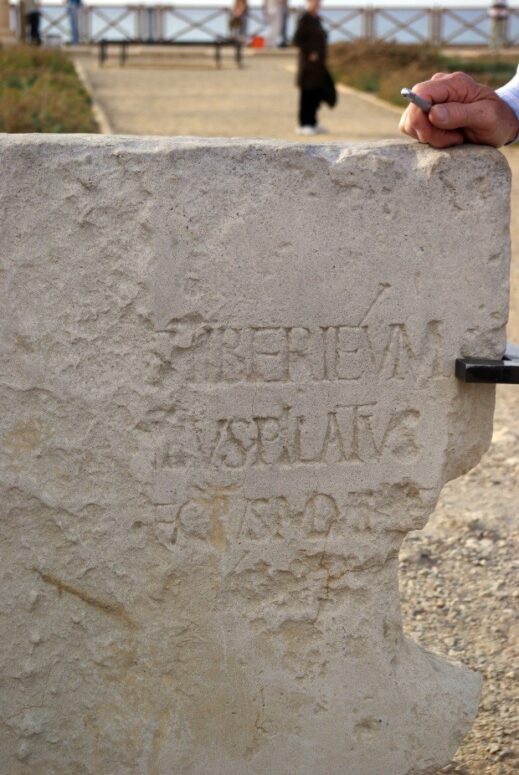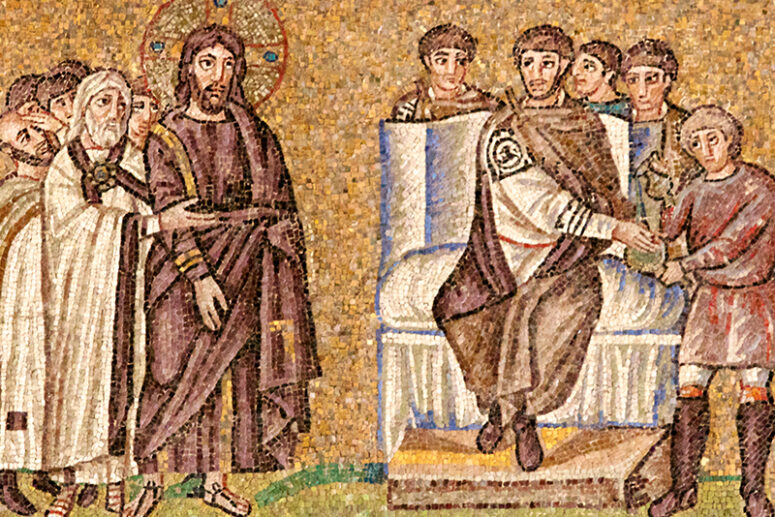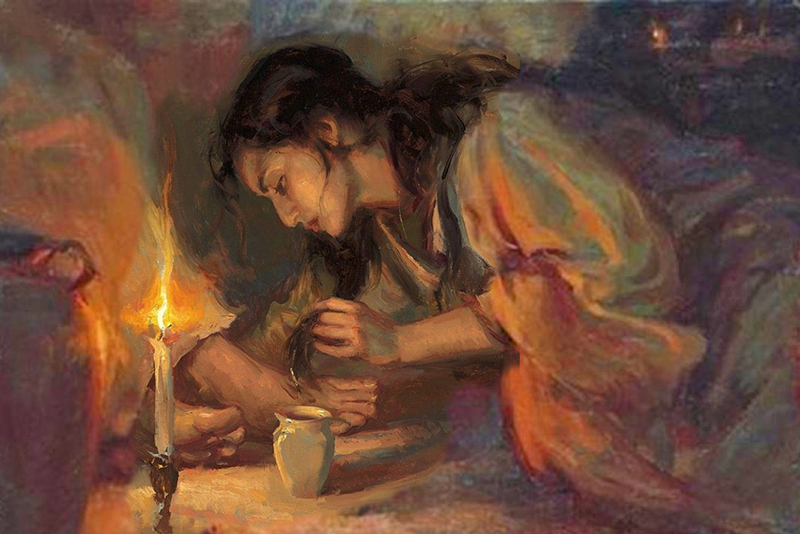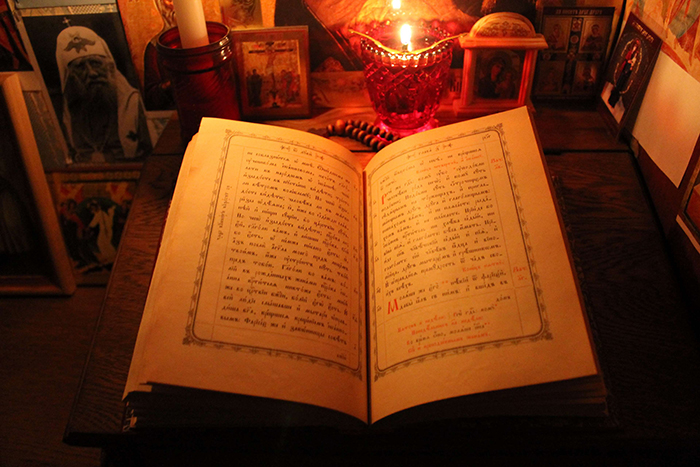
He is in the Bible and in secular literature. Mikhail Bulgakov depicts him in his famous novel “Master and Margarita” as a gentle and kindly fellow. Yet until recently, historians were unsure if such a person ever existed. So what is fact and fiction about the proverbial procurator of Judea? Let us try and find out.
Was Pontius Pilate a real person?
Most historians believe so now, but until 1961 he was considered a legendary figure. Only a few ancient chronicles mentioned his name, but many experts questioned their reliability. The most convincing proof of Pilate’s existence as a historical figure and a ruler of Judea was the discovery by a team of Italian archaeologists of a marble plaque that stated his name and position.

Was Pontius Pilate his real name?
We do not know his first name. We only have a record of his family name, Pontius, pointing to his noble lineage. He belonged to an old Italic clan that goes back to the third century BC. It had its origins in the Samnites, an ancient Italic people. They lived in the highlands, fought multiple wars with the Romans, but finally suffered defeat. Some were killed; others were enslaved. The elite of the Samnites became members of the Roman nobility.

What does Pilate mean?
Pilate is Pontius’ nickname, which translates as ‘javelin thrower’. This part of his name suggests that military service and warfare were the primary occupations of Pontius and his closest ancestors. Most likely, he would have made his career serving in the Roman Army.
What were his position and title?
Officially, he bore the title of Prefect. The inscription on the plaque from Palestine said exactly this, “Pontius Pilate, the prefect of Judea, dedicated to the people of Caesarea this temple in honour of Tiberius”. The prefect was a military position. However, Pontius’ actual duties extended beyond the typical mandate of a prefect. De-facto, he was responsible for all aspects of the Roman governorship of the province of Judea.
How did they call him procurator?
Pontius performed duties that the mandate of a procurator would normally include. In the Roman Empire, a procurator was a high-ranking administrator of the state responsible for a wide range of mostly civilian matters. Cornelius Tacit was the first Roman historian who referred to Pontius as procurator. That was because in his time, the title of procurator synonymous with the governor of a Roman province.
Pontius was a military officer.
Why was his civilian mandate so extensive? During the worldly life of our Lord and Saviour, Judea was a province of the Roman Empire. Up until 6 AD, it was governed by puppet kings such as those of the Herod dynasty. Afterwards, the Romans abandoned this practice. The Emperor of Rome began to appoint exarchs who reported directly to him. Yet because the Jews had always been hostile to Roman rule, any minor discontent had the potential to escalate to a major rebellion. Because of the high risk, Rome had to maintain a large military contingent in Judea. As its commander, Pontius wielded almost unlimited power. As an officer of the Roman Empire in Judea, he was the fifth in rank. His authority was equivalent to that of a Roman Exarch.
According to the Ancient historians and chroniclers, his contemporaries knew him as a ruthless war dog, a merciless killer of civilians, and also a bribe-taker and self-seeker. He became prefect in 26 AD and remained in this position for ten years. The Jews hated him. Frequent mass executions were hallmarks of his rule. He suppressed with brutal force even the slightest signs of discontent. His rule was synonymous with oppressive taxes and heavy-handed political repression. His acts of blasphemy upset many Jews and raised protests. However, by the standards of his time, his actions and policies were nothing unusual, so the Romans did not see him as a criminal. But he was certainly not the sentimental kindly man depicted in Mikhail Bulgakov’s Master and Margarita.
Did Pontius recognize Jesus as a threat to him?
Most ancient historians agreed that Pontius most likely saw Jesus as yet another vagrant philosopher, son of a carpenter and partly out of his wits. He saw no danger in him walking around the desert with a handful of disciples preaching to them about some kingdom. Remarkably, during his interrogation of Christ, he asks him the question, ‘what is truth’? Most likely, he never meant it as a question but more as a derisive comment.

Why was he soft on Christ?
His wife objected to His execution strongly. Her complaints about her sleepless nights and heavy headaches made Pontius hesitant. She attributed her ill health to her anticipation of the execution and pleaded with her husband to spare Jesus. Christ’s reference to His divine dignity also made Pontius uneasy as a Pagan. If there was a possibility that the man from Nazareth was one of the godheads, there might be retribution, he thought. In the end, Pontius decided to hedge his bets by subjecting Christ to flagellation but giving Him clemency.
Why did he change his plans?
The Sinedrion, the high religious court in Judea, insisted on the execution of the Righteous One, whom it hated. The Jewish elders had prepped the crowd. The crowd shouted, “Crucify him!”. Pontius knew that it had been manipulated, but he also did not want any extra problems. The Jews had threatened to write to the Emperor if Pontius did not approve the death sentence. Finally, he chose to cast aside his ‘sentimental motives’ for the sake of appeasing the crowd. Jesus was sentenced to die on the cross.
What happened to Pontius after the execution of Christ?
The documentary evidence is limited. He suppressed a popular revolt in 36, and the Jews sent a complaint about his actions. The complaint reached the Emperor, and his legate in Syria Vitellius, who was above Pontius in rank and lineage, removed him from his office and sent him to Rome. There are no reliable records that shed light on his later life. According to some apocryphal writings and legends, he was exiled to Gallia, in modern France, where he committed suicide, unable to bear the disgrace and humiliation of removal from office. Some accounts suggest that he may have converted to Christianity and died for his faith in circa 64 at the time of the prosecution of Christians under Emperor Nero.
What do we know about Pontius’ wife?
Her name was Claudia Procula. After the resurrection of Christ, she became a Christian. According to some accounts, she was the woman whom Apostle Paul referred to as Claudia in his final greetings to a disciple (2 Timothy 4:21). Some Greek Orthodox churches (e.g. the Church of Constantinople) have glorified Claudia as a saint.

The Orthodox Creed mentions the name Pontius Pilate to underline Christ’s life in the world as a fact of human history.
Translated by The Catalogue of Good Deeds
Source: https://foma.ru/kto-takoy-pontiy-pilat.html




